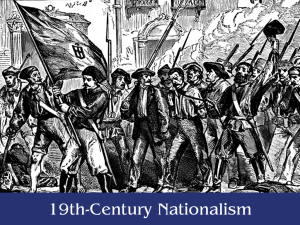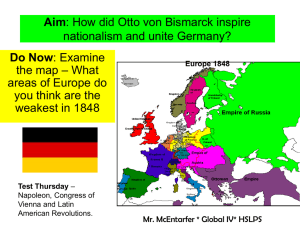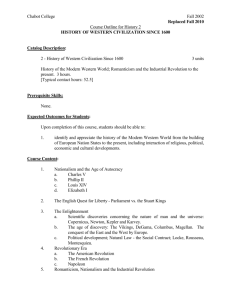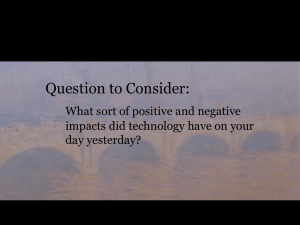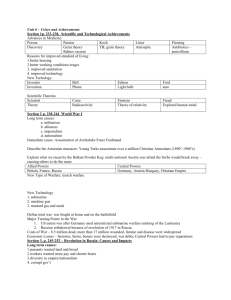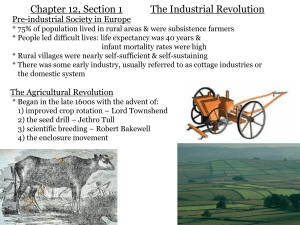Legacy: West & the World Chapter 8 Nations in Upheaval
advertisement
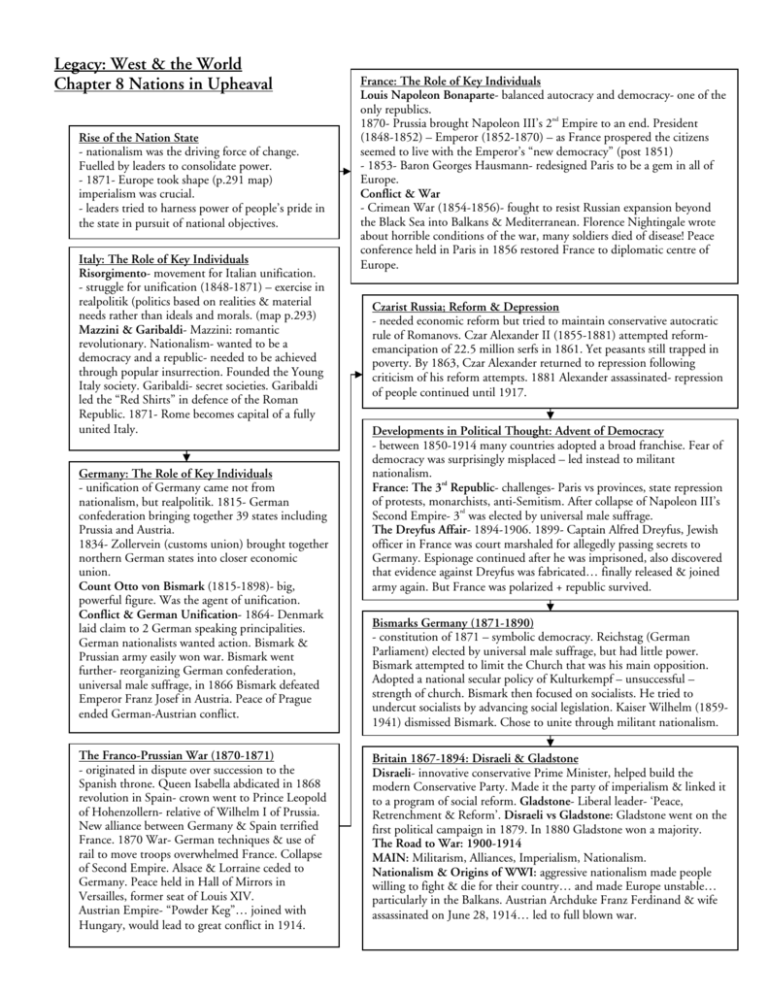
Legacy: West & the World Chapter 8 Nations in Upheaval Rise of the Nation State - nationalism was the driving force of change. Fuelled by leaders to consolidate power. - 1871- Europe took shape (p.291 map) imperialism was crucial. - leaders tried to harness power of people’s pride in the state in pursuit of national objectives. Italy: The Role of Key Individuals Risorgimento- movement for Italian unification. - struggle for unification (1848-1871) – exercise in realpolitik (politics based on realities & material needs rather than ideals and morals. (map p.293) Mazzini & Garibaldi- Mazzini: romantic revolutionary. Nationalism- wanted to be a democracy and a republic- needed to be achieved through popular insurrection. Founded the Young Italy society. Garibaldi- secret societies. Garibaldi led the “Red Shirts” in defence of the Roman Republic. 1871- Rome becomes capital of a fully united Italy. Germany: The Role of Key Individuals - unification of Germany came not from nationalism, but realpolitik. 1815- German confederation bringing together 39 states including Prussia and Austria. 1834- Zollervein (customs union) brought together northern German states into closer economic union. Count Otto von Bismark (1815-1898)- big, powerful figure. Was the agent of unification. Conflict & German Unification- 1864- Denmark laid claim to 2 German speaking principalities. German nationalists wanted action. Bismark & Prussian army easily won war. Bismark went further- reorganizing German confederation, universal male suffrage, in 1866 Bismark defeated Emperor Franz Josef in Austria. Peace of Prague ended German-Austrian conflict. The Franco-Prussian War (1870-1871) - originated in dispute over succession to the Spanish throne. Queen Isabella abdicated in 1868 revolution in Spain- crown went to Prince Leopold of Hohenzollern- relative of Wilhelm I of Prussia. New alliance between Germany & Spain terrified France. 1870 War- German techniques & use of rail to move troops overwhelmed France. Collapse of Second Empire. Alsace & Lorraine ceded to Germany. Peace held in Hall of Mirrors in Versailles, former seat of Louis XIV. Austrian Empire- “Powder Keg”… joined with Hungary, would lead to great conflict in 1914. France: The Role of Key Individuals Louis Napoleon Bonaparte- balanced autocracy and democracy- one of the only republics. 1870- Prussia brought Napoleon III’s 2nd Empire to an end. President (1848-1852) – Emperor (1852-1870) – as France prospered the citizens seemed to live with the Emperor’s “new democracy” (post 1851) - 1853- Baron Georges Hausmann- redesigned Paris to be a gem in all of Europe. Conflict & War - Crimean War (1854-1856)- fought to resist Russian expansion beyond the Black Sea into Balkans & Mediterranean. Florence Nightingale wrote about horrible conditions of the war, many soldiers died of disease! Peace conference held in Paris in 1856 restored France to diplomatic centre of Europe. Czarist Russia; Reform & Depression - needed economic reform but tried to maintain conservative autocratic rule of Romanovs. Czar Alexander II (1855-1881) attempted reformemancipation of 22.5 million serfs in 1861. Yet peasants still trapped in poverty. By 1863, Czar Alexander returned to repression following criticism of his reform attempts. 1881 Alexander assassinated- repression of people continued until 1917. Developments in Political Thought: Advent of Democracy - between 1850-1914 many countries adopted a broad franchise. Fear of democracy was surprisingly misplaced – led instead to militant nationalism. France: The 3rd Republic- challenges- Paris vs provinces, state repression of protests, monarchists, anti-Semitism. After collapse of Napoleon III’s Second Empire- 3rd was elected by universal male suffrage. The Dreyfus Affair- 1894-1906. 1899- Captain Alfred Dreyfus, Jewish officer in France was court marshaled for allegedly passing secrets to Germany. Espionage continued after he was imprisoned, also discovered that evidence against Dreyfus was fabricated… finally released & joined army again. But France was polarized + republic survived. Bismarks Germany (1871-1890) - constitution of 1871 – symbolic democracy. Reichstag (German Parliament) elected by universal male suffrage, but had little power. Bismark attempted to limit the Church that was his main opposition. Adopted a national secular policy of Kulturkempf – unsuccessful – strength of church. Bismark then focused on socialists. He tried to undercut socialists by advancing social legislation. Kaiser Wilhelm (18591941) dismissed Bismark. Chose to unite through militant nationalism. Britain 1867-1894: Disraeli & Gladstone Disraeli- innovative conservative Prime Minister, helped build the modern Conservative Party. Made it the party of imperialism & linked it to a program of social reform. Gladstone- Liberal leader- ‘Peace, Retrenchment & Reform’. Disraeli vs Gladstone: Gladstone went on the first political campaign in 1879. In 1880 Gladstone won a majority. The Road to War: 1900-1914 MAIN: Militarism, Alliances, Imperialism, Nationalism. Nationalism & Origins of WWI: aggressive nationalism made people willing to fight & die for their country… and made Europe unstable… particularly in the Balkans. Austrian Archduke Franz Ferdinand & wife assassinated on June 28, 1914… led to full blown war. Society in Modern Europe Rise of a Dominant Middle Class: industrialization accelerated past 1850… population grew, the economy grew, standard of living improved. As a result of shift in pol., eco., & society- changed from an elitist society to a mass culture with a large middle class. Middle class size grew, poor grew. Middle class came to dominate morality of societybecame hallmark of Victorian Age (1837-1901) Social Organization in the 19th Century Pop Culture: middle class, leisure time was new, newspapers, holidays, railways, free time. Technology & Society- 2nd Industrial Revolution (1880-1939) - new breakthroughs in production and labour. Telephone, electric lights, automobile, steam & rail, bikes, streetcars, subways… science played a bigger role- Germany, US, Britain & Japan were leaders in technological innovation. Machine made goods pushed programs forward- left many people behind that did not adapt. The Evolving Women - women increasingly dissatisfied with subordinate role. Also “equality & egalitarianism & vote” – not extended to women. Feminist Movements across Europe: confronted inequality in church, state, home- everywhere the vote was an obvious symbol of inequality. ‘suffragette’ movements grew in countries- the battle was only beginning. Union Communities & Trade Unionism -laws biased toward gender & social class. Working class was growing and wanted to improve their wages & conditions. Idea of unionization grew- trade unions put pressure on employers through strikes & picketing. Developments in Political Thought: Socialism. Socialism- trade unionists & working people… Marx had a big influence. Employees vs Employers. Marx saw conflict between bourgeoisie & working class. Marx’s socialism was meant to be an international movement. - In several European states on the eve of WWI, revolutionary rhetoric of socialists/trade unions created a sense that the state & economy were potential hostages to action of working class. Revolution in Russia, 1905 Czar Nicholas II- czar from 1894-1917- rapid industrial development & political repression= potential for explosion. The working class was growing. - Vladimir Lenin one of the founders of the Bolshevik Party. Argued for a revolution of the masses led by the elite. 1905- a revolution occurring in Russia. They had just lost a war with Japan. Jan 22, 1905 troops killed several hundred peaceful demonstrators which led to mass strikes. This forced Nicholas II to create a Duma or parliament. This settled Russia uneasily until WWI, and finally the Russian Revolution of 1917. End of Chapter- Science, Philosophy, Art & Literature. Pp.315-329 Good images and reading regarding Charles Darwin.
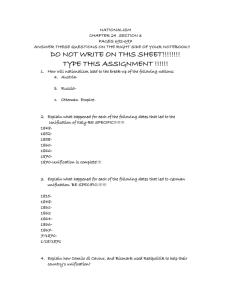


![“The Progress of invention is really a threat [to monarchy]. Whenever](http://s2.studylib.net/store/data/005328855_1-dcf2226918c1b7efad661cb19485529d-300x300.png)
